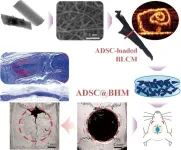(Press-News.org) Scientists at the Medical College of Georgia at Augusta University are searching for a new treatment target for a common complication of diabetes that can cause retinal blood vessels to break down, leak, or become blocked.
Diabetic retinopathy is a serious eye disease and a leading cause of blindness that results when diabetes’ sustained high blood sugar levels cause damage to the retina – the part of the eye that detects light – over time. That can happen in a number of ways, from inflammation to overgrowth of new and abnormal blood vessels.
The current treatment standard is anti-VEGF, which targets and blocks the activity of vascular endothelial growth factor (VEGF), a protein that promotes the growth of blood vessels and causes them to leak. But that treatment doesn’t work for everyone.
With a new $1.5 million grant from the National Eye Institute, vascular and endothelial biologist Shruti Sharma, PhD, and a team from the MCG Center for Biotechnology and Genomic Medicine, hope to zero in on a new treatment pathway. They suspect the key to that may be a protein called Interleukin-6 (IL-6), a versatile protein involved in both immunity and inflammation throughout the body.
“IL-6 is a major cytokine that is elevated in almost all inflammatory conditions,” Sharma explained. “There have been therapies that have targeted IL-6, but whenever we try to completely block it, that never seems to work. I don’t think it’s that black or white.”
She and her research team think the answer lies in the way IL-6 signals or initiates physiological changes in the body. One mechanism involves cis-signaling, where IL-6 interacts with its receptor on the cell surface, while the other involves trans-signaling, which uses a soluble form of IL-6 receptor.
The harmful inflammatory effects of IL-6 are accomplished mainly through trans-signaling, while beneficial regenerative effects are accomplished through cis-signaling.
“So that's where the problem was. When you’re globally blocking all the IL-6, you are taking away the good and the bad,” Sharma said. “We already know that trans-signaling works through endothelial cells, because they lack the membrane-bound receptor, which would explain the inflammation and overgrowth of blood vessels in the eye.”
In preliminary studies, she and her research team found that blocking the pro-inflammatory IL-6 trans-signaling, with a drug called sgp130Fc, helped balance levels of two important proteins in the retina - VEGFA, which can damage the blood-retina barrier and increase oxidative stress, and VEGFB, which is believed to be protective. They believe that disruption to that balance is what ultimately leads to the development of diabetic retinopathy.
They hope finding the way to restore that balance will come from taking a closer look at Müller glial cells, which play a major role in maintaining homeostasis and exchange of nutrients in the retina. They also have membrane-bound IL-6 receptors and “participate” in both cis- and trans-signaling. “There are also certain factors released by these glial cells that help activate endothelial cells,” Sharma said.
They will study several different animal models – one that uses trans-signaling, one that uses cis-signaling and one that does both – and gather baseline measurements of the photoreceptor response, which can tell them how well the eye can detect light, a key indicator of retinal health or disease.
“We believe that when we selectively inhibit trans-signaling using this drug, while allowing cis-signaling to continue, we will be able to stop the damage,” Sharma said.
A recent global analysis estimated that about 103 million people worldwide have diabetic retinopathy, and that number could rise to 161 million by 2045.
END
Medical College of Georgia scientists searching for new treatment target for diabetic retinopathy
2024-09-12
ELSE PRESS RELEASES FROM THIS DATE:
High doses of some prescription stimulants tied to increased psychosis risk
2024-09-12
Prescribing rates for stimulants that treat attention-deficit/hyperactivity disorder (ADHD) have increased significantly over the past decade, with some of the largest increases reported during the COVID-19 pandemic. A new study of adult emergency department admissions at Mass General Brigham, led by McLean Hospital researchers, found that individuals who are taking high doses of amphetamine (e.g. Adderall) face more than a five-fold increased risk for developing psychosis or mania. Findings were published September 12th in the American Journal of Psychiatry.
Overall, individuals with past-month prescription amphetamine use had a greater likelihood of new-onset psychosis or mania ...
New national survey shows hesitancy about vaccines this fall
2024-09-12
With flu season just around the corner and COVID-19 cases on the rise, a new nationwide survey from The Ohio State University Wexner Medical Center reveals hesitancy around vaccines this fall. The new data comes just as this year’s flu shot rolls out and following the FDA’s approval of an updated round of COVID-19 vaccines.
The national poll of 1,006 people found more than one-third (37%) have gotten vaccines in the past but do not plan to this year. The same percent of respondents said they don’t need any of the vaccines surveyed in the poll, including flu, COVID-19, pneumococcal and respiratory ...
Revolutionary tubular scaffolds boost stem cell-driven bone regeneration in skull defects
2024-09-12
Scientists from Sun Yat-sen University's School of Biomedical Engineering have developed groundbreaking tubular scaffolds made from electrospun membranes, which significantly enhance bone regeneration in critical skull defects. These scaffolds, designed to mimic natural bone structures, create an ideal environment for adipose-derived stem cells (rADSCs) to thrive and accelerate healing. By integrating advanced materials like polycaprolactone, PLGA, and nano-hydroxyapatite, the researchers achieved remarkable results in both lab and animal studies, ...
UTokyo attosecond institute welcomes Nobel laureate
2024-09-12
Nobel laureate Pierre Agostini, winner of the 2023 prize in physics, will headline a special two-day event hosted by the University of Tokyo on Sept. 26-27. The keynote lecture by Agostini, renowned for this pioneering work in attosecond science, will be part of a larger symposium bringing together researchers from around the world to celebrate the university’s planned Attosecond Laser Facility (ALFA), and discuss the latest developments and future directions of attosecond science.
Have you taken a photo of a fast-moving animal or vehicle and noticed how blurry the subject can be? This is likely because the faster a moving subject is, the faster the camera’s shutter needs ...
Single dose of mpox vaccine effective in preventing infection, study finds
2024-09-11
Toronto, ON, September 11, 2024 — A single dose of the Modified vaccinia Ankara-Bavarian Nordic (MVA-BN) was 58% effective in protecting again mpox infection, according to a new study published in BMJ.
Researchers from ICES, Public Health Ontario, and the MAP Centre for Urban Health Solutions at St. Michael’s Hospital of Unity Health Toronto have conducted a target trial emulation to estimate the effectiveness of the mpox vaccine.
During the mpox outbreak in 2022, Ontario, Canada introduced the vaccine ...
One dose of smallpox vaccine moderately effective in preventing mpox infection
2024-09-11
One dose of modified vaccinia Ankara-Bavarian Nordic (MVA-BN) smallpox vaccine is moderately effective in preventing mpox infection and should be made available to communities at risk, finds a study published by The BMJ today.
With mpox infections rising again across the globe, the researchers say these findings “strengthen the evidence that MVA-BN is effective at preventing mpox infection and should be made available and accessible to communities at risk.”
No randomised clinical trials of vaccination against mpox have been conducted. Estimates of the effectiveness of a single dose of vaccination from observational studies range from ...
More than half of UK government nutrition advisors are paid by food companies
2024-09-11
More than half of the experts on the UK government’s nutrition advisory panel have links to the food industry, reveals an investigation by The BMJ today.
At least 11 of the 17 members of the Scientific Advisory Committee on Nutrition (SACN) have conflicts of interest with the likes of Nestle, sugar manufacturer Tate and Lyle, and the world’s largest ice cream producer, Unilever, reports freelance journalist Sophie Borland.
And at least six out of the 11 members of SACN’s Subgroup on Maternal and Child Nutrition have ties to food firms, including baby food manufacturers and formula milk brands.
SACN ...
Shorter-course radiation better option for breast cancer patients than conventional schedule
2024-09-11
Giving higher doses per fraction of radiation therapy over a shorter time after breast cancer surgery significantly reduces the risk of side effects and improves quality of life compared with a conventional schedule, finds a study published by The BMJ today.
Although survival and recurrence rates were similar, this approach, known as hypofractionation, is safer, more convenient for patients, and reduces costs for healthcare systems, and should be the preferred treatment option, say the researchers.
Conventional fractionation radiation therapy has been the standard of care for most patients with breast ...
Obesity treatments being restricted by cash poor local services
2024-09-11
Obesity treatments are being restricted by cash poor local services across England with many patients being denied specialist drugs, surgery and support, an investigation by The BMJ has found.
Patients in nearly half the country can’t get appointments with specialist teams for weight loss support and care, including treatment with drugs such as semaglutide. And in nearly one in five local health areas, patients don’t have access to a bariatric surgery service, reports Elisabeth Mahase.
The government estimates that obesity costs the NHS in England around £6.5bn a year and is the second biggest preventable cause ...
Laughter may be as effective as drops for dry eyes
2024-09-11
Laughter may be as effective as eye drops in improving symptoms of dry eye disease, finds a clinical trial from China published by The BMJ today
The researchers suggest that laughter exercise could be an initial treatment for relieving symptoms of dry eye disease.
Dry eye disease (DED) is a chronic condition estimated to affect around 360 million individuals worldwide. Common symptoms include uncomfortable, red, scratchy or irritated eyes.
Evidence suggests that laughter therapy alleviates depression, anxiety, stress, and chronic pain, while strengthening immune ...


